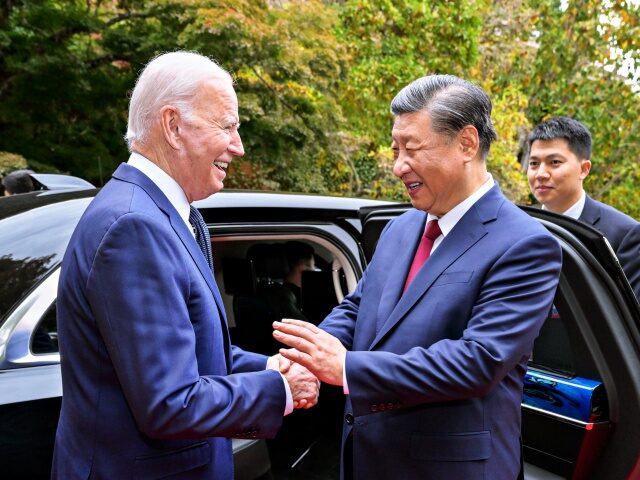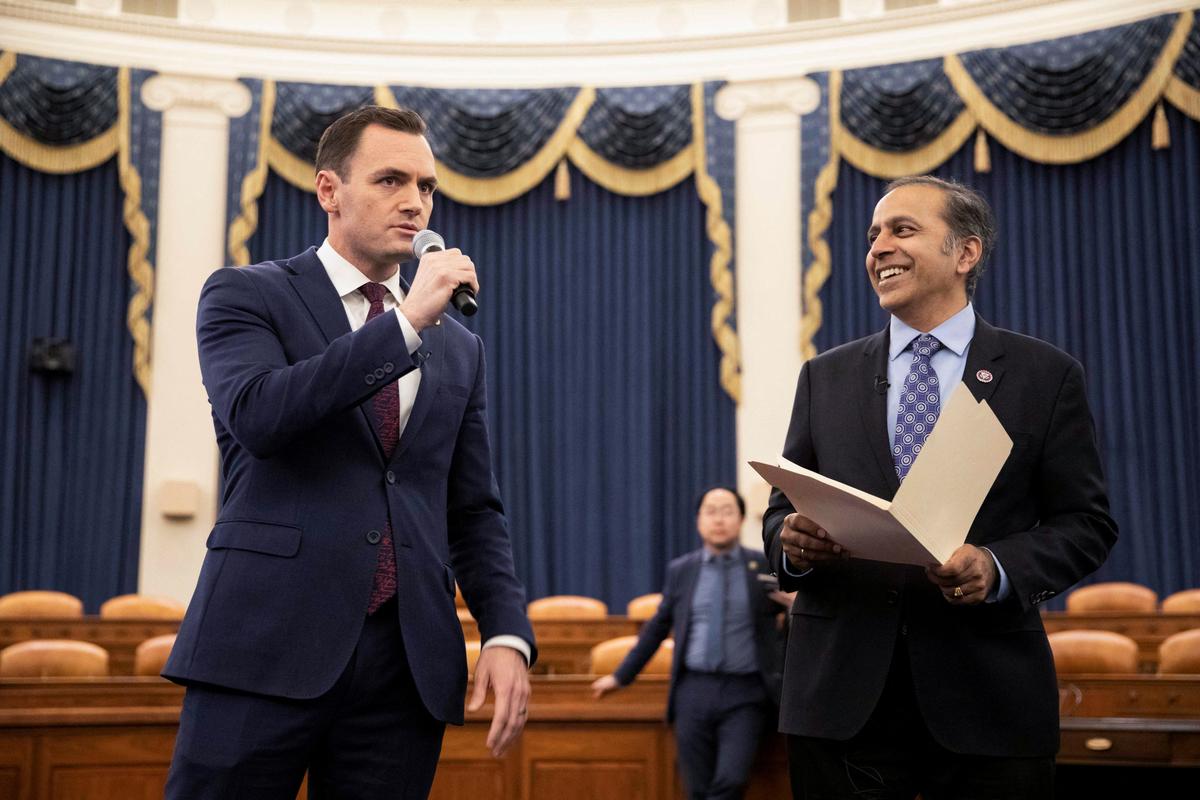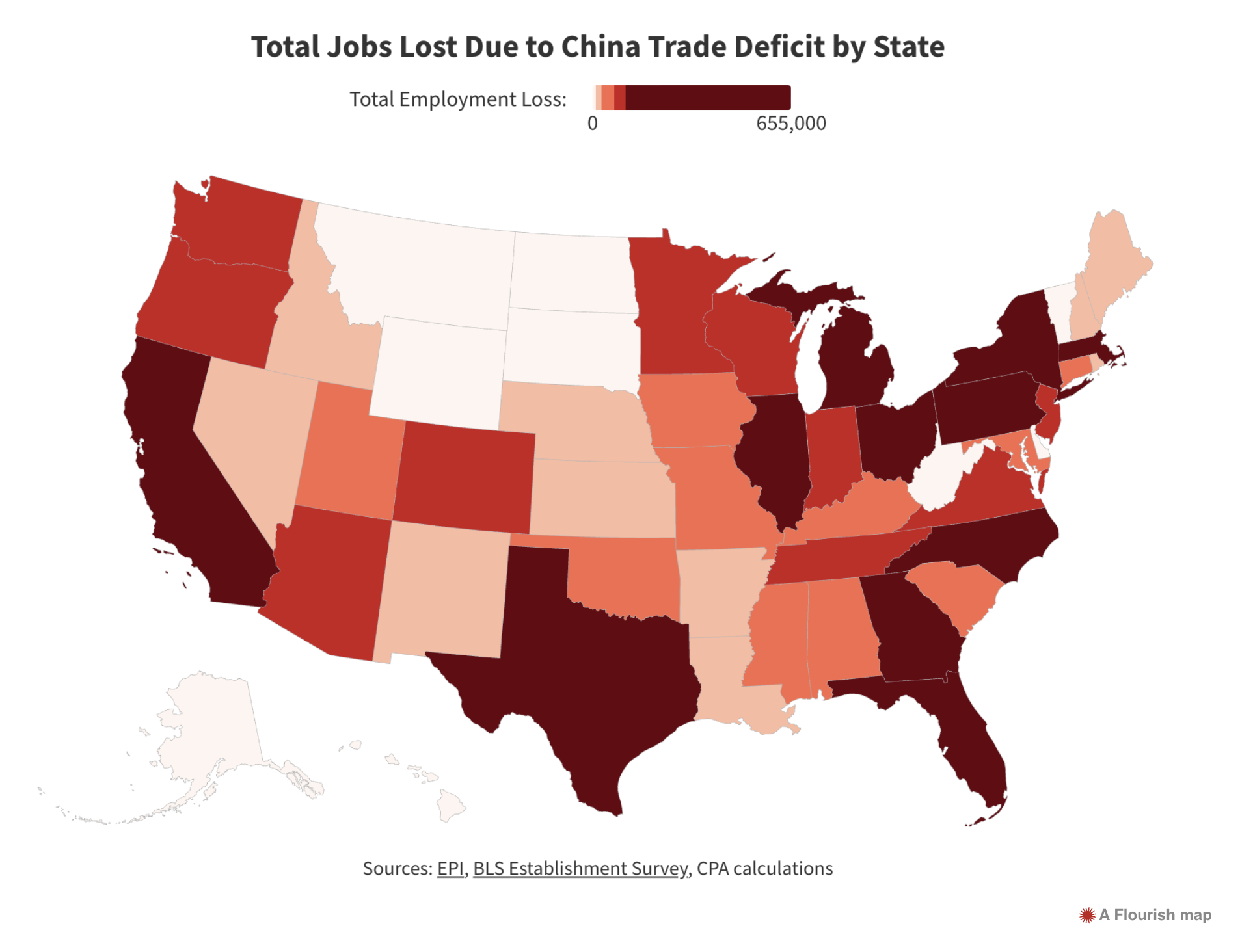IF YOU TOOK THE BRIBES SUCKERS OUT OF THE DEMOCRAT PARTY THERE WOULDN'T BE MUCH LEFT!
THE ONLY WAY WE CAN PROTECT OURSELVES FROM RED CHINA IS TO PUT BIDEN IN TRAITORS' PRISON!
House Select Committee: U.S. Must Revoke Free Trade with China, Hike Tariffs

The United States ought to hike tariffs on China and revoke its decades-long, job-killing free trade policy with the communist country, the House Select Committee on the Chinese Communist Party (CCP) recommends.
Over the last year, the bipartisan committee investigated the economic impact that the People’s Republic of China (PRC) has had on the nation’s job market, manufacturing base, and national security since entering the World Trade Organization (WTO) in 2001.
Rep. Mike Gallagher (R-WI) chairs the committee alongside Rep. Raja Krishnamoorthi (D-IL). Reps. Andy Barr (R-KY), Jim Banks (R-IN), Ashley Hinson (R-IA), Ro Khanna (D-CA), and Seth Moulton (D-MA) are among the members who sit on the committee.
In its report, issued Tuesday, the committee recommends President Joe Biden’s administration, as well as Congress, adopt nearly 150 policies to counter the CCP’s grasp on the U.S. economy.
Among the recommendations is the pivotal policy to revoke China’s permanent normal trade relations status (PNTR) with the U.S., which was approved in 2001 by Congress and backed by former President George W. Bush.
“We acknowledge that granting the PRC PNTR did not lead to the benefits expected for the United States nor did it lead to the structural reforms in the PRC that Congress expected,” the committee writes:
Instead, it has ceded critical U.S. economic leverage in our relationship with the PRC. Furthermore, the PRC’s consistent failure to meet its WTO obligations and its systemic and widespread State and Party intervention in market decisions, economic coercion, IP theft, cyber-attacks, forced labor, lack of basic transparency, and the rule of law have harmed U.S. industry, workers, and manufacturers. [Emphasis added]
Therefore, Congress should:
Move the PRC to a new tariff column that restores U.S. economic leverage to ensure that the PRC abides by its trade commitments and does not engage in coercive or other unfair trade practices and decreases U.S. reliance on PRC imports in sectors important for national and economic security. This shift should be phased in over a relatively short period of time to give our economy the time necessary to adjust without avoidable disruptions. [Emphasis added]
Likewise, the committee recommends Congress pass the COOL Online Act to require country-of-origin labeling for products purchased by American consumers online.
The bill has been introduced by Rep. Carlos Giménez (R-FL) and Sen. Tammy Baldwin (D-WI) and is cosponsored by Rep. Andy Kim (D-NJ) as well as Sens. J.D. Vance (R-OH), Rick Scott (R-FL), Josh Hawley (R-MO), Mike Braun (R-IN), and Sherrod Brown (D-OH).
Also, the committee wants Congress and Biden to approve a measure that would ban U.S. investment in Chinese corporations that have been flagged by the federal government for their ties to the CCP and the national security threat they pose.
Michael Stumo, CEO of the Coalition for a Prosperous America (CPA), praised the committee’s findings and recommendations:
Importantly, this bipartisan report recognizes that granting China permanent normal trade relations status was a serious mistake, and that Congress must revoke China’s status to counter the CCP’s economic and trade strategy that has devastated American manufacturers and workers. Additionally, we applaud the Committee for recognizing that CCP companies engaged in human rights abuses and forced labor, as well as Chinese military firms, are being funded by U.S. capital markets. While some lawmakers who are beholden to Wall Street want to allow this to continue, Members of the House China Committee recognize that funding our greatest geopolitical and military adversary through our capital markets is insanity and must be addressed. [Emphasis added]
The U.S. trade deficit with China, since 2001, has eliminated nearly four million American jobs. Almost three million of these lost jobs, or about 75 percent, were in the nation’s manufacturing sector.
A study from CPA, published in September, shows that ending U.S. free trade with China would create some two million American jobs and grow the nation’s economy by nearly two percent.
Another study from 2022 similarly found that imposing U.S. tariffs on all foreign imports would create a whopping ten million American jobs — three million of which would be high-paying manufacturing jobs, while 6.9 million would be jobs in supporting industries.
John Binder is a reporter for Breitbart News. Email him at jbinder@breitbart.com. Follow him on Twitter here.
Commerce Sec’y: Made Progress with China Meeting, But It’s Harder to Do Business, Not Surprised Hacking Didn’t Let Up
During an interview aired on Tuesday’s broadcast of CNBC’s “Mad Money,” Commerce Secretary Gina Raimondo stated that there was “a little bit of progress” from President Joe Biden’s meeting with Xi Jinping, but she keeps hearing from CEOs “that it’s getting harder to do business in China,” and that she wasn’t surprised to hear that cybersecurity companies reported Chinese hacking hasn’t decreased at all after the meeting.
Host Jim Cramer said, “So, let’s discuss what happened at your dinner in San Francisco, because I was hoping that there would be a cessation of what I would regard as being ill-advised acts by the Chinese. But I’m not sure there has been.”
Raimondo responded, “Yeah, well, we weren’t hoping for magic, Jim. We were just hoping for a little bit of progress. And I think we got a little bit of progress. President Biden had, I think, a very productive, constructive, candid, direct discussion with President Xi. I was able to be part of that meeting. I spent hours with my counterpart. And we said to them, listen, action speaks louder than words. President Xi and his minister said to us they want more foreign direct investment, they want U.S. companies to do business there. We said to them, show us, don’t tell us, show us. Don’t rip off our I.P., have a regulatory environment that’s fair and not arbitrary and capricious, don’t target U.S. companies. And so, we began the dialogue, which is a good step. Nothing good will happen if we don’t even talk. We’ve seen a little progress. You saw the VMware acquisition by Broadcom approved, you see Mastercard being allowed to do business there, expand their digital business. But we have a long way to go, Jim. And I think they need to show us that they’re serious that they want us to do business there. And that means protecting I.P.”
Cramer then said “Madam Secretary, what I’m concerned about is, for instance, right after the dinner, we spoke with Palo Alto Networks and CrowdStrike, those are the two most sophisticated companies in terms of cybersecurity. And both of them said there is actually no let-up whatsoever in hacking after that dinner.”
Raimondo responded, “I can’t say that I’m surprised. I do hear from CEOs. I meet with a couple of CEOs every week who have either just come back from China or call me or are thinking of going, and they report similarly that it’s getting harder to do business in China, not easier. But we’re not going to let up. Jim, as you know, I’m a dog on a bone. U.S. business deserves an advocate. They deserve a fair shake. We’re not asking for any special treatment. We just want a level playing field. And we’re going to keep making the case.”
Follow Ian Hanchett on Twitter @IanHanchett
Peter Schweizer’s ‘Red-Handed’ Hits #1 on New York Times Bestseller List for 4th Week
1,406 Breitbart News
Breitbart News
2 Mar 2022205
7:17
Peter Schweizer’s blockbuster new book Red-Handed: How American Elites Get Rich Helping China Win has landed at number one on the New York Times bestseller list for a fourth week since its release by HarperCollins, after dropping to number two on the list last week.

Schweizer, whose past books have sparked an FBI investigation and exposed congressional insider trading that spearheaded groundbreaking legislation, has called the revelations in Red-Handed the “scariest” of his quarter-century career investigating corruption.
As the book’s subtitle states, Red-Handed exposes the vast complicity of elites – from politicians to diplomats to business, tech, and entertainment tycoons – who have enriched themselves by advancing the interests of China’s communist regime.
Schweizer, who is the president of the nonpartisan Government Accountability Institute (GAI) and a Breitbart News senior contributor, spent over a year conducting the research for Red-Handed with his team of forensic investigators at GAI, combing through a trove of financial and corporate records. The book contains 1,093 endnotes and 81 pages of source material with no off-the-record sources, making it easier for federal law enforcement and U.S. intelligence services to track down the book’s bombshell revelations.
Last month, U.S. House Republicans introduced the “Stop CCP Act” to impose sanctions on Chinese Communist Party (CCP) officials, including Chinese dictator Xi Jinping and his family, Breitbart reported last moth. The legislative proposal comes on the heels of the shocking revelations in Schweizer’s book.
Leaders on Capitol Hill — including Sen. Marsha Blackburn (R-TN) and Rep. Elise Stefanik (R-NY) — are also calling for Attorney General Merrick Garland to appoint a special counsel to investigate the revelations in Red-Handed concerning President Joe Biden’s family members’ business dealings with individuals with direct ties to the highest levels of China’s spy apparatus.
The New York Post’s editorial board echoed these calls in an op-ed headlined, “Appoint a special counsel on Hunter Biden—now.”
Breitbart’s coverage of Red-Handed’s revelations include:
· How the Biden family scored some $31 million from five deals in China, all with individuals with direct ties to the highest levels of China’s intelligence apparatus
· How a Chinese global energy company linked to a Chinese intelligence operation sent close to $6 million to Hunter Biden in 2017
· How American elites — including the Silicon Valley Masters of the Universe — purposefully aid the communist regime of China
· How donations from Communist China to the University of Pennsylvania almost tripled after the university established a “Biden Center” in 2017 and gave former Vice President Joe Biden a professorship
· How Hunter Biden planned to share his family’s office space in Washington, DC, with a Chinese intelligence-linked firm that employed a man Hunter described as “the f**king spy chief of China”
· How Hunter Biden’s business deals were helpful to the Belt and Road Initiative, which is China’s colonialist scheme for buying influence across the Third World and luring poor nations into taking loans from Chinese banks they can never repay
· How 23 former U.S. senators and congressmen (most of whom are Republican) have lobbied for Chinese military or intelligence-linked companies after leaving office
· How 20 Republicans from the highest levels of our government sold out to China
· How politicians use tepid criticism of China’s human rights abuses as cover to continue doing Beijing’s bidding — a concept the CCP refers to as “big help with a little bad mouth”
· How members of the Bush family cashed in on friendship with the Chinese official involved in the Tiananmen Square massacre
· How the husband of Sen. Dianne Feinstein (D-CA), who chaired the Senate Intelligence Committee, was the part owner of a Chinese firm that allegedly sold computers with spyware chips to the U.S. military
· How House Speaker Nancy Pelosi (D-CA) softened her previous criticism of the Chinese Communist Party as her husband and son scored big business deals in China
· How Pelosi reined in her criticism of the 2008 Beijing Olympics after her family members were involved in business ventures in China that would benefit from the 2008 Games
· How Canadian Prime Minister Justin Trudeau has followed in his father Pierre’s footsteps both in assuming high office and in using it to further the interests of the Chinese Communist Party
· How a CCP regime-linked company promoted Justin Trudeau’s entry into politics by publishing a Chinese language edition of Pierre Trudeau’s travelogue through Maoist China during the Cultural Revolution
· How Wall Street titan Steve Schwarzman of Blackstone launched a $100 million global education scholarship program for Americans and other students studying in China to inculcate the superiority of Chinese communism
· How Antony Blinken helped American universities “navigate problems” of legally balancing their Pentagon contracts while still accepting Chinese funding of dubious origin, and how he encouraged the U.S. government to deny political asylum to a high profile Chinese Communist Party defector who could have been a priceless intelligence asset for the United States
· How American universities have often not complied with federal laws when it comes to accepting donations linked to the Chinese Communist Party
Schweizer’s track record investigating both Republicans and Democrats is well-established, winning him a unique mix of bipartisan praise for his investigative work from both the left and the right. After the release of Schweizer’s bestselling Clinton Cash, liberal columnist Eleanor Clift called Schweizer “an equal-opportunity investigator, snaring Republicans as well as Democrats.” Clift added: “It’s a mistake for the Clinton campaign to write off conservative author Peter Schweizer as a right-wing hack. It won’t work, and it’s not true.” Similarly, Harvard Law School Professor Lawrence Lessing wrote that “on any fair reading, the pattern of behavior that Schweizer has charged is corruption.”
Schweizer is also the author of Throw Them All Out, which, according to left-leaning Slate, was “the book that started the STOCK Act stampede.” The bipartisan STOCK Act (Stop Trading on Congressional Knowledge) banned insider trading by members of Congress and was signed into law by President Barack Obama on April 4, 2012. The legislation received overwhelming support from both parties. One of the main figures featured in Schweizer’s Throw Them All Out, then-chairman of the House Financial Services Committee Spencer Bachus (R-AL), announced he would not seek reelection after the book’s reporting. CBS’s 60 Minutes did an investigative report on Schweizer’s revelations that won them the Joan Shorenstein Barone Award for excellence in Washington-based journalism.
Bipartisan Lawmakers Call for Breaking Economic Ties With China


WASHINGTON—A bipartisan group of lawmakers in Congress are calling for the United States to “reset” its relationship with China by raising tariffs and cutting off capital flows fueling aggression by the communist regime.
In a report incorporating nearly 150 recommendations on Dec. 12, the House Select Committee on the Chinese Communist Party warned about the regime’s “multidecade campaign of economic aggression” that has made the United States dependent on Beijing—to its peril.
Among the list of recommendations from the 53-page report are closing the loopholes that allow Beijing to steal U.S. technologies, forcing a ban or divestment of Chinese-owned social media app TikTok, imposing tariffs on legacy Chinese semiconductors, and directing the Federal Reserve to stress test its resilience to a potential loss of access to the Chinese market.
Committee chairman Rep. Mike Gallagher (R-Wis.) described the report as a blueprint to “turbocharge the American economy for decades to come.”
“The status quo is not working,” he told reporters on Dec. 12. “We shouldn’t have wasted a day, let alone a decade on that old bet.”
Mr. Gallagher made clear that he wasn't asking for a complete decoupling. He has “no problems with Wisconsin farmers selling soybeans to China” or “Americans buying cheap textiles or toys in China—as long as they're not made with slave labor,” but more economic interaction won't make the Chinese regime less repressive internally and less aggressive externally.
“The United States now has a choice: accept Beijing’s vision of America as its economic vassal or stand up for our security, values, and prosperity,” Mr. Gallagher and ranking Democratic member Raja Krishnamoorthi of Illinois said in the report.
Mr. Gallagher said Republicans are having a “robust discussion” with relevant stakeholders about the best path forward on restricting outbound investment toward China. A measure regarding the issue was dropped from the annual National Defense Authorization Act, but the lawmaker hopes to see some “responsible legislative activity” in the first quarter of the coming year.
"Even those major asset managers or bankers with whom we've engaged that are skeptical of any restrictions on investment in China, even in military and critical technological areas, I think would welcome the predictability that legislating the issue would provide," he said.
The report signals a shift of bipartisan view on how to approach China that contrasts with the decades-long U.S. thinking that economic cooperation would be mutually beneficial and lead to a more open China.
Instead, since China entered the World Trade Organization in 2001, the Chinese regime has increasingly weaponized the economic reliance to undercut U.S. national security and values, according to the report.
The heavy U.S. dependence on China for pharmaceutical ingredients exposes Americans vulnerable to contamination risks, the report states, and China’s dominance on medical devices is similarly troubling in light of how it blocked exports of critically needed medical equipment during the height of the COVID-19 pandemic.
The lesson, according to the report, is that the United States must “act now to build an economic contingency plan and reduce its dependence on the PRC [People's Republic of China] in critical sectors, address the PRC’s penetration of U.S. capital markets, and build greater collective resilience with allies and partners.”
The report was lauded by a number of industry groups and those who had been advocating for a tougher stance on China.
Joseph Cella, former ambassador to Fiji, Kiribati, Nauru, Tonga, and Tuvalu, said it offered “a clear-eyed view of the perilous terrain we are on with China in this new Cold War, particularly when it comes to state level incursions and influence operations.”
David McCall, president of United Steelworkers International, said they appreciate the committee’s efforts to “hold the CCP [Chinese Communist Party] accountable and protect American workers” because although its members can “compete against anyone on a level playing field ... too often they instead face the CCP’s illegal trade practices.”
Kim Glas, president and CEO of the National Council of Textile Organizations, said he believes that the policy recommendations from the committee can help address the economic headwinds brought by predatory Chinese trade practices.
“The U.S. textile and apparel manufacturing sector has been on the receiving end of some of the worst predatory trade practices by China, including substantial intellectual property theft, coupled with rampant abuse of state-owned enterprises and subsidies, and horrifying labor abuses in Xinjiang, which have enabled the country to dominate world markets in this sector,” he said.
The committee isn’t alone in hoping to curb investment funds going to China.
On Dec. 12, Sens. Marco Rubio (R-Fla.) and Rick Scott (R-Fla.), as well as Rep. Elise Stefanik (R-N.Y.), introduced the American Investment Accountability Act, to ensure that Congress is informed about outbound investment data into China.



No comments:
Post a Comment